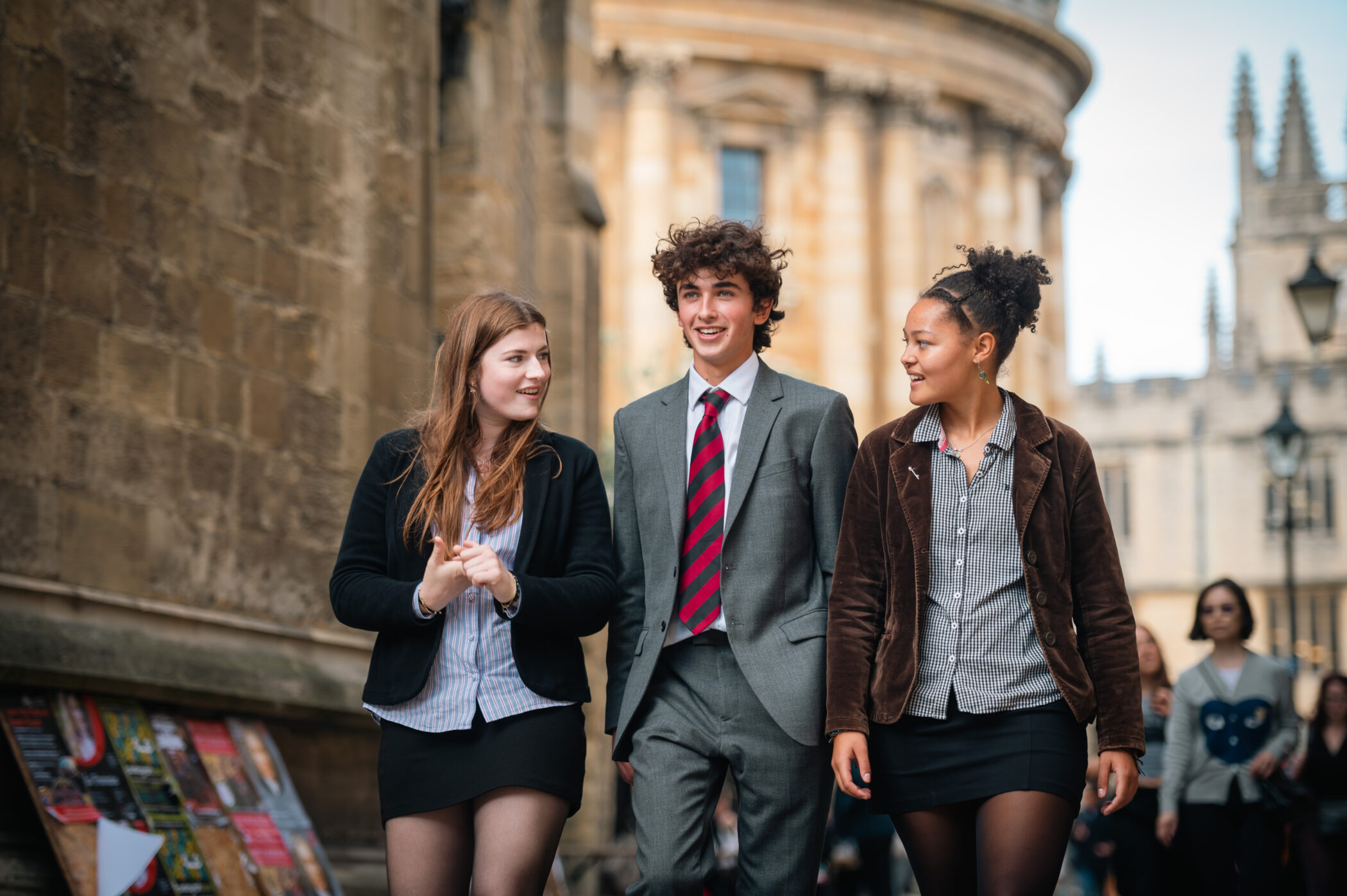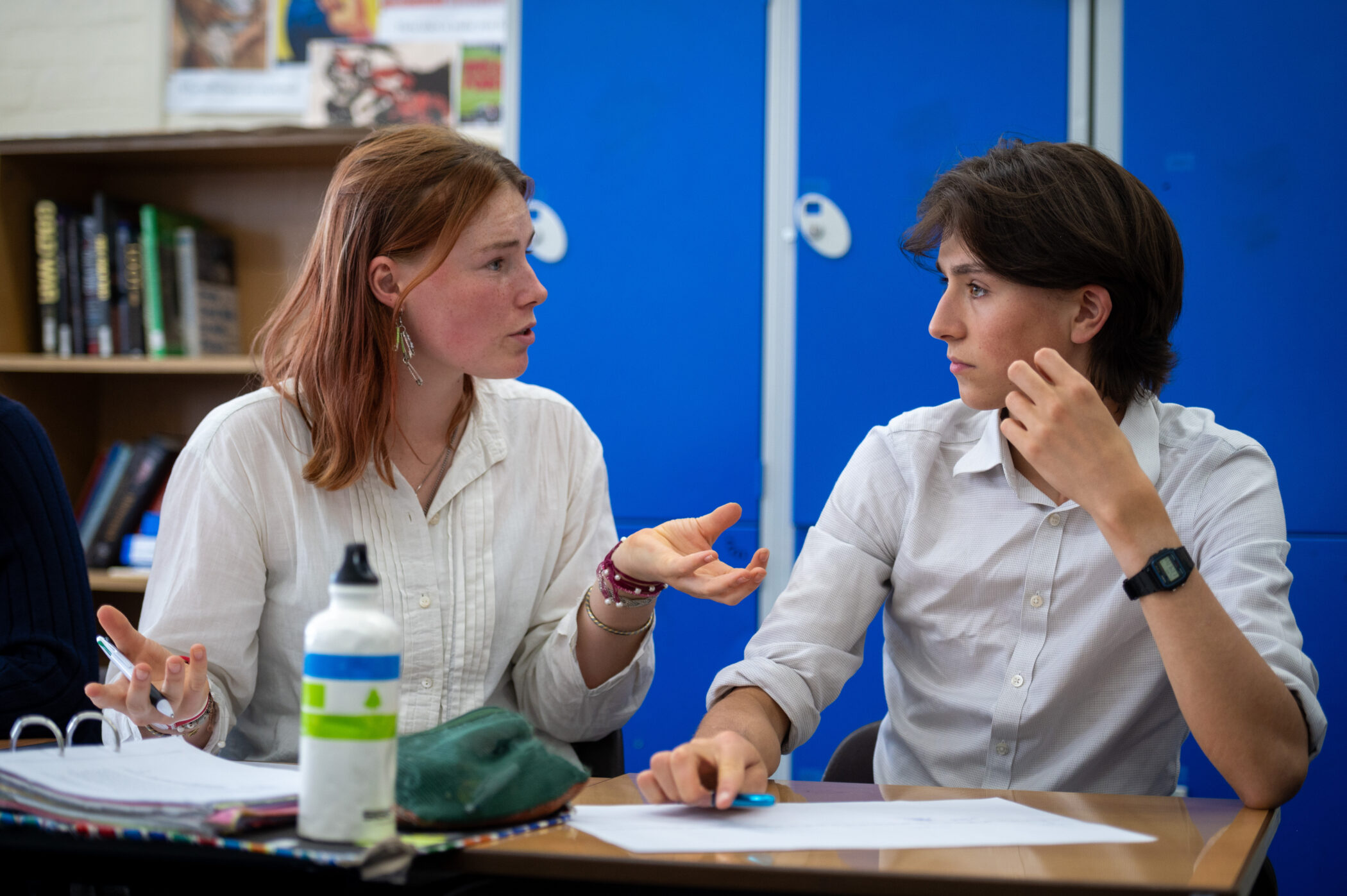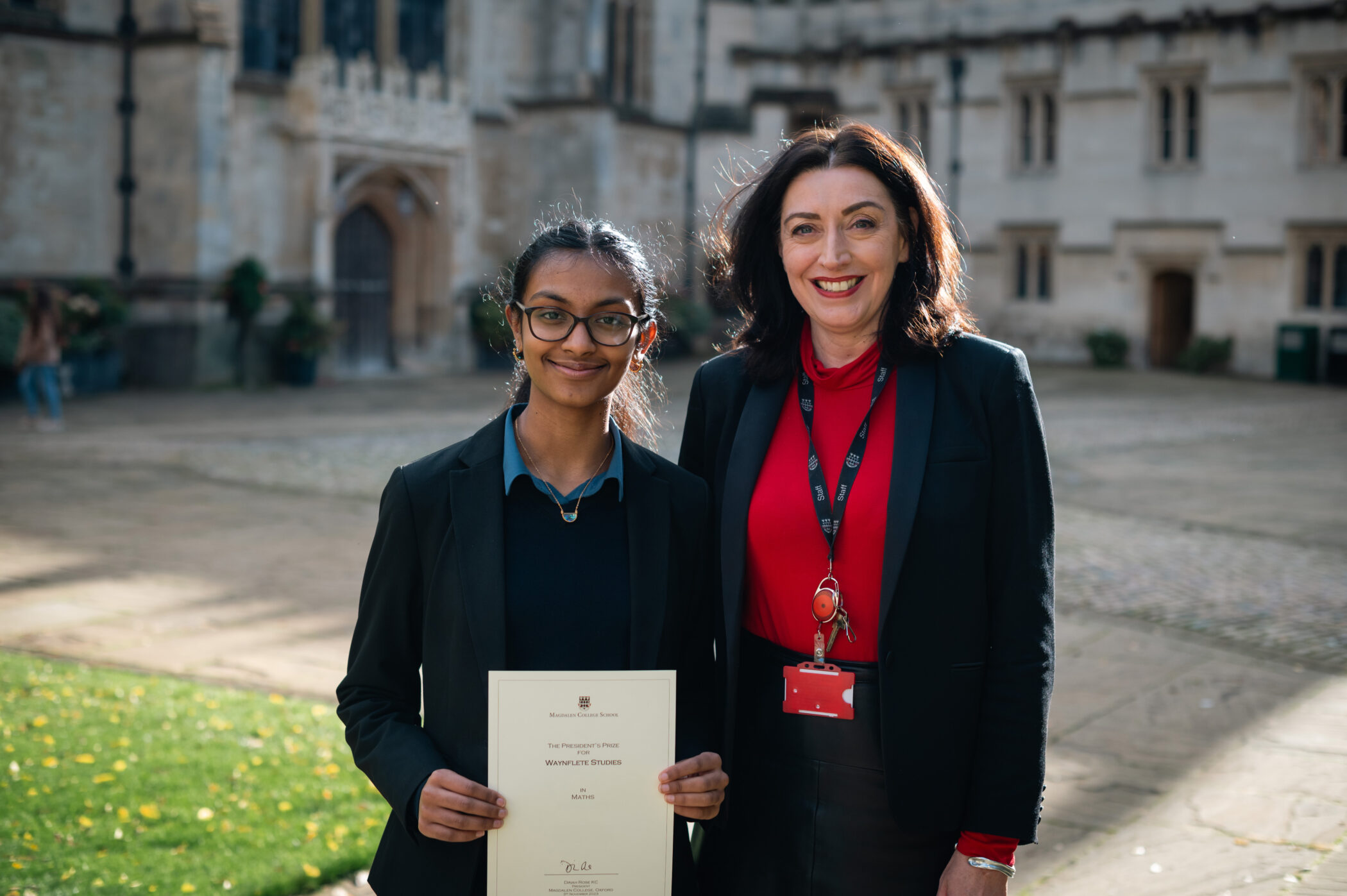A Level English Literature
A Level English Literature introduces you to some of the most enjoyable, inspiring and challenging writing from the late 1300s to the present day. The course ranges widely across and beyond the traditional canon, whilst sharpening your skills in analysing how writers shape their ideas. You are encouraged to make connections between the texts you study and to explore them within their intellectual, cultural, social and historical contexts. The subject is highly valued by universities and employers for the skills it fosters in thinking critically, reading sensitively, approaching problems creatively, evaluating others’ views perceptively, and expressing arguments concisely and persuasively. We follow the OCR specification.
Numerous extra-curricular opportunities supplement the course. There is an annual trip to London for the Lower Sixth, taking in two different plays and a museum visit. Theatre trips to Stratford and London happen regularly. There are frequent creative writing workshops and competitions. The English Society puts on weekly extension seminars, some student led, others given by teachers and visiting academics.
Overview
In the Lower Sixth, you will begin with introductory courses with each of your two teachers. These bridge the transition from GCSE and encourage you to make connections between the texts encountered, exploring them within their intellectual, cultural, social and historical contexts. From October, you will begin work on your set texts. With one teacher, you will work on American Literature 1880-1940, studying The Great Gatsby and The Grapes of Wrath. With the other, you will focus on Pre-1900 Poetry and Drama, beginning with Chaucer’s The Merchant’s Prologue and Tale and then comparing this with John Webster’s tragedy The Duchess of Malfi.
In the Upper Sixth, you will study your set Shakespeare play in depth (Hamlet, Measure for Measure, Richard III or Twelfth Night), and will complete your coursework. This is a portfolio consisting of a close reading or piece of recreative writing inspired by your study of a contemporary text, and a comparative essay on two further texts. There is lots of scope for independent work and for studying writings from other English-speaking cultures. Examples of coursework texts recently taught in the department include Butterworth’s Jerusalem, Ford’s The Good Soldier, Mansfield’s stories, McEwan’s Atonement, Penhall’s Blue/Orange, Rhys’s Wide Sargasso Sea, Stoppard’s Arcadia and poetry by Elizabeth Bishop, T. S. Eliot, Philip Larkin, Kei Miller, Claudia Rankine and Roger Robinson.
‘A Level English was enjoyable for me in a very mind-expanding way. I was exposed to so many insightful perspectives on important topics—both from the texts themselves, and from my classmates. I got to know the people in my English class better than my other classes, I think because we were discussing this amazing range of texts that had a way of revealing things about the human experience. It was great preparation for university-level courses; I didn’t find the transition as hard as I expected. It taught me essay-writing and critical thinking skills, in particular how to engage with lots of different voices in an essay: the text (or texts), my own opinion, the views of critics past and present, and contemporaneous literary or historical voices. I didn’t have to do that in any other subject, and it was very useful. Overall, I think I loved English as a subject because literature is essentially about people and stories, which are such fundamental parts of everyone’s experience, and as such are endlessly interesting.’
– Former pupil studying English Literature
Study Preparation
The best way to prepare for the course is by reading widely as widely and adventurously as possible, using the ideas below as a starting point. Over the summer, we would like you to read The Great Gatsby and at least two other texts, including one American novel published between 1880 and 1940 (asterisked on the list). You can supplement this by taking advantage of some of the theatre being performed locally and via streaming sites.
You can find out about the subject in general, and about many of the works listed below, at the British Library’s ‘Discovering Literature’ site. Many of the texts themselves can be downloaded for free from Project Gutenberg or Google Books. For a good paperback overview of the subject, try Jonathan Bate’s English Literature: A Very Short Introduction (2010). Old Waynflete Robert Eaglestone’s Doing English (2009) is an excellent introduction to some of the more theoretical aspects of studying the subject in the sixth form and at university.
| Marlowe, Christopher | Dr Faustus | c.1590 |
| Shakespeare, William | Henry IV Part One, As You Like It, King Lear, Sonnets | 1597-1609 |
| Burrow, Colin (ed.) | Metaphysical Poetry | 2006 |
| Pope, Alexander | The Rape of the Lock | 1714 |
| Swift, Jonathan | Gulliver’s Travels/A Modest Proposal | 1726/1729 |
| Walpole, Horace | The Castle of Otranto | 1764 |
| Austen, Jane | Pride and Prejudice/ Emma | 1813/1815 |
| Brontë, Emily | Wuthering Heights | 1847 |
| Brontë, Charlotte | Jane Eyre | 1847 |
| Collins, Wilkie | The Woman in White | 1859 |
| Eliot, George | The Mill on the Floss/Middlemarch | 1860/1872 |
| Dickens, Charles | Great Expectations | 1861 |
| James, Henry | The Portrait of a Lady | 1881 |
| Twain, Mark | Huckleberry Finn | 1884 |
| Wilde, Oscar | The Importance of Being Earnest | 1895 |
| Hardy, Thomas | Tess of the D’Urbervilles | 1891 |
| Conrad, Joseph | Heart of Darkness/The Secret Agent | 1899/1907 |
| Dreiser, Theodore | Sister Carrie | 1900 |
| Joyce, James | Dubliners | 1914 |
| Eliot, T. S. | Prufrock and Other Observations | 1917 |
| Cather, Willa | My Antonia | 1918 |
| Wharton, Edith | The Age of Innocence | 1920 |
| Woolf, Virginia | Mrs Dalloway/A Room of One’s Own | 1925/1928 |
| Waugh, Evelyn | Decline and Fall/A Handful of Dust | 1928/1935 |
| Faulkner, William | The Sound and the Fury | 1929 |
| Hemingway, Ernest | A Farewell to Arms | 1929 |
| Larsen, Nella | Passing | 1929 |
| Roth, Henry | Call It Sleep | 1934 |
| Barnes, Djuna | Nightwood | 1936 |
| Hurston, Zora Neale | Their Eyes Were Watching God | 1937 |
| Wright, Richard | Native Son | 1940 |
| Greene, Graham | The Power and the Glory | 1940 |
| Beckett, Samuel | Waiting for Godot | 1953 |
| Achebe, Chinua | Things Fall Apart | 1958 |
| Plath, Sylvia | The Bell Jar/Ariel | 1963/1965 |
| Larkin, Philip | The Whitsun Weddings/High Windows | 1964/1974 |
| Vonnegut, Kurt | Slaughterhouse Five | 1969 |
| Carter, Angela | The Bloody Chamber | 1979 |
| Atwood, Margaret | The Handmaid’s Tale/The Testaments | 1985/2019 |
| Roy, Arundhati | The God of Small Things | 1997 |
| Smith, Zadie | White Teeth/NW | 2000/2014 |
| McEwan, Ian | Atonement | 2001 |
| Adichie, Chimamanda Ngozi | Purple Hibiscus/Half of a Yellow Sun | 2003/2006 |
| Rankine, Claudia | Citizen | 2014 |
| Barry, Sebastian | Days Without End | 2016 |
| Evaristo, Bernadine | Girl, Woman, Other | 2019 |
Shakespeare
The following all offer very good overviews of Shakespeare’s work and style:
Simon Palfrey Doing Shakespeare (2005)
Emma Smith This is Shakespeare (2019)
Jonathan Bate The Genius of Shakespeare (1997)
Sean McEvoy Shakespeare: The Basics (2000)
Stanley Wells William Shakespeare: A Very Short Introduction (2015)
You could also sign up for the MOOC (Massive Open Online Course) that King’s College London has put together for something more interactive: Shakespeare, Print and Performance.
An enjoyable way of beginning to think about the ways Shakespeare has been interpreted over the years would be to read some novels inspired by his plays. For example, if you studied Macbeth for GCSE, you could read Jo Nesbø’s eponymous thriller. If you’ve seen King Lear, why not compare Jane Smiley’s reimagining of it in the American west, A Thousand Acres (1991), with Edward St Aubyn’s Lear-as-Rupert-Murdoch satire, Dunbar (2017)? If you want to read more contemporary fiction, consider how two of the most praised novels of 2019 – Mark Haddon’s The Porpoise and Ali Smith’s Spring – both rework Pericles, a late play Shakespeare probably co-authored with George Wilkins. For novelisations of other plays, see http://hogarthshakespeare.com/.
Poetry
There are several excellent anthologies of poetry which you could dip into. The Oxford Book of English Verse (ed. Christopher Ricks, 1999) and The Penguin Book of English Verse (ed. Paul Keegan, 2000) are good examples; others can easily be found in second hand bookshops. We would strongly recommend that you buy one of these and get into the habit of regularly and randomly picking, reading and re-reading a short poem or two. James Fenton’s An Introduction to English Poetry (2003) is a readable handbook.
How to choose
Go to the library, a bookshop or an online bookseller that allows you to ‘look inside’. Browse. Read the first page, or the synopsis, or take Ford Madox Ford’s advice: ‘Open the book to page ninety-nine and the quality of the whole will be revealed to you.’ Enjoy!
‘At school I always considered myself to be more of a scientist, and although I did well at GCSE, English was never an easy subject for me. I wanted to go into a scientific career (which I eventually did, reading Biology and then Medicine at university) and so chose Biology, Chemistry and Maths at A-Level. However, in order to broaden my horizons a little I decided to choose English Literature as my fourth A-Level and over the years I have come to realise how providential that choice was. Having a fairly reductionist philosophical viewpoint at the time (which I wasn’t aware of!), in my teenage years I felt science and technology had all the answers to the world’s problems. But English Literature opened my mind to the world of beauty, poetry, and art, to emotion, heroism, virtue and love, to the struggle between good and evil and the various other realities that make up the drama of human life (on which I think science can only shed some light, if at all). In short, it helped me to (gradually!) understand the wisdom of Hamlet’s words to Horatio: “There are more things in heaven and Earth, Horatio, / Than are dreamt of in your philosophy”.’
– Former pupil studying English Literature
 MCS ranks among the top independent secondary schools, and in 2024 was awarded Independent School of the Year for our contribution to social mobility.
MCS ranks among the top independent secondary schools, and in 2024 was awarded Independent School of the Year for our contribution to social mobility.

 28 of our pupils achieved 10 or more 8 or 9 grades in 2024.
28 of our pupils achieved 10 or more 8 or 9 grades in 2024.
 In 2023-24, MCS received over £448,000 in donated funds.
In 2023-24, MCS received over £448,000 in donated funds.

